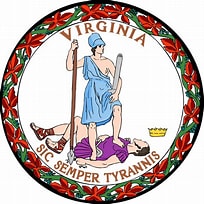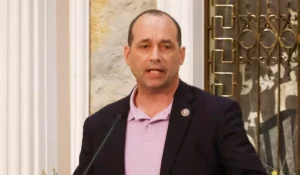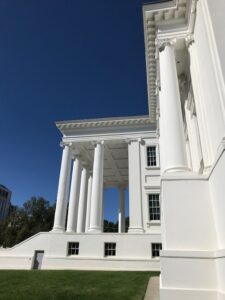 by Joe Fitzgerald
by Joe Fitzgerald
There’s a donor in CFReports named “no name.” He, she, or it is listed on the report as “Name, No.” This same donor is called “Unknown Entity” in VPAP. Or perhaps “Entity, Unknown.” (VPAP and CFReports are described in Part 1.)
This donor’s address shows up as Matt Cross’s house on his campaign reports. (The address is public record, but it feels like doxing to use it here.) “No Name” gave Cross $170 for his 2021 campaign for the Rockingham County School Board, which he now chairs.
Cross’s reports demonstrate two things about Virginia’s system for campaign finance reporting. One is that it’s as easy to make at least a dozen mistakes as it is to make one. The other is that if a report is riddled with errors, it’s not clear what’s to be done about it.
Cross’s finance reports are good examples of the idea that the kind of campaign a politician runs can show us what kind of public official they will be. Cross’s reports show a candidate who appears to either not know how to fill out the reports or perhaps thinks the rules don’t apply to him. Maybe that’s what we should expect of a candidate who, upon taking leadership of a like-minded board, began banning books without regard for how they were chosen or what the process is for challenging a book. Instead they are banning books regardless of whether they’re in county schools, based not on any identifiable process but on vague parental complaints they have yet to produce.
The law on “No Name” at Cross’s house is that any campaign donor must be identified by name, address, and occupation. If that information is not available, the money is not supposed to be used for campaign purposes, but should be donated to charity. In the past, local candidates have given unidentified money as well as unspent funds to churches or non-profits. (Where the money goes is not regulated. One Harrisonburg City Council candidate, unopposed for re-election, gave $460 to his son for “campaigning.”) There is no report on VPAP of Cross donating any campaign money to charity, so it’s hard to say what he did with No Name’s $170.
As noted above, the donor’s occupation is supposed to be listed on CFReports. But that information does not appear on any of the donors in a particular group of campaign reports, defined further down. Continue reading →
 by Martin Caplan, MD, and Kenneth Lipstock, MD
by Martin Caplan, MD, and Kenneth Lipstock, MD
 by Hans Bader
by Hans Bader
 by Joe Fitzgerald
by Joe Fitzgerald
 by Joe Fitzgerald
by Joe Fitzgerald by Joe Fitzgerald
by Joe Fitzgerald by the staff of Liberty Unyielding
by the staff of Liberty Unyielding by the staff of The Cadet
by the staff of The Cadet

 from Liberty Unyielding
from Liberty Unyielding by Matt Hurt
by Matt Hurt
